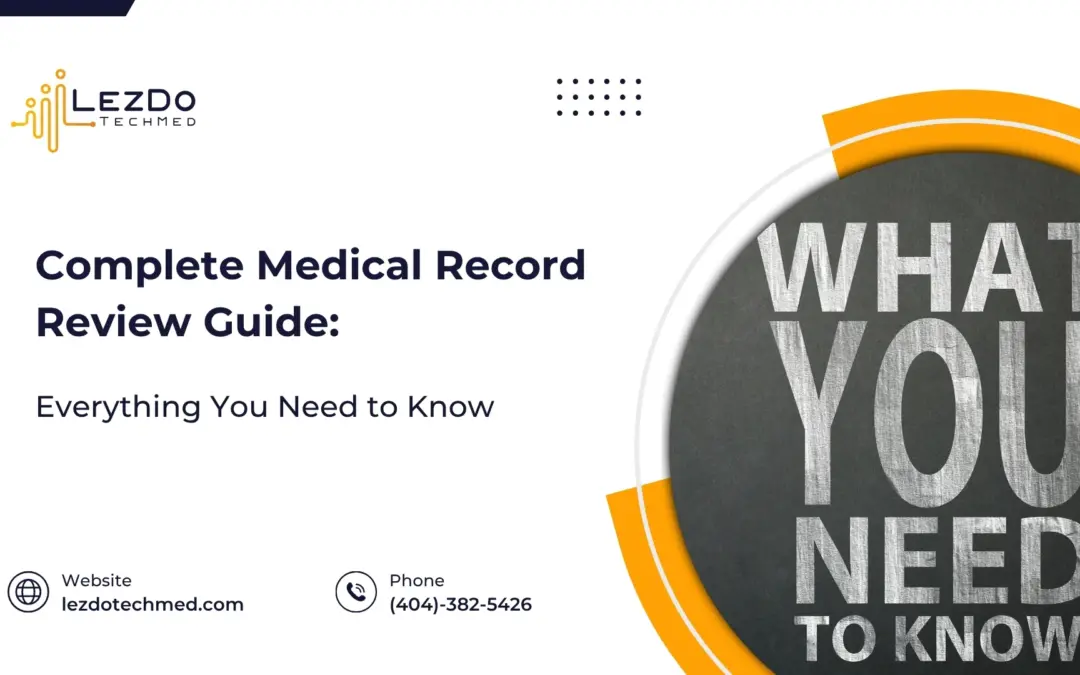For attorneys working on cases like personal injury, medical malpractice, or insurance claims, medical records often forms the most crucial evidence. However, these records are often complex and packed with technical terms that can be hard to understand. This is where dedicated medical record reviewers become essential.
Having a professional who has vast experience in reviewing and organizing medical records can make a huge difference. Medical record reviewers for attorneys help by saving time, avoiding mistakes, and building stronger cases. In this article, we’ll explore why every attorney should have a team of dedicated medical record reviewers on their team and how it can lead to better case outcomes.
Role of Expert Medical Record Reviewers
Medical record reviewers have a vital role in transforming the most complicated medical records into crucial evidence in court during arguments. Let’s see how efficiently they can assist attorneys in handling legal claims.
1. Simplifying medical data
Medical records can be overwhelming due to the technical language or medical terms used and the vast amount of information they contain. Medical record reviewers break down these data, highlighting important information in clear and concise summaries. This helps attorneys prepare for depositions, cross-examinations, and trial presentations without getting drowned by complex medical details. Professional record reviewers ensure that nothing is overlooked, which is crucial while presenting a stronger argument.
2. Organizing medical records
Medical records are often unstructured and disorganized, making it challenging for attorneys to extract relevant information. Medical record reviewers bring order to this chaos by organizing records into easily accessible categories, such as physician’s notes, diagnostic reports, and treatments. They also arrange the records in chronological order, creating a clear timeline of the patient’s medical history. This organization makes it easier for attorneys to find the information they need to support their case.
3. Creating accurate and objective summaries
With their deep knowledge in medical and legal fields, medical record reviewers create accurate and unbiased summaries of medical data. These summaries provide a clear picture of the patient’s medical condition, treatment, and any inconsistencies in the medical records. When this information is presented in an easily understandable format, it allows the attorneys to make more informed decisions and enhances their ability to present legal arguments effectively.
4. Strengthening legal arguments
Medical record reviewers identify inconsistencies, gaps, or red flags in a patient’s medical history that could be crucial for the attorney’s argument. Whether it’s uncovering discrepancies in treatment timelines or identifying missing records, these experts offer insights that could shift the balance of a case. Their ability to pinpoint significant medical events and align them with legal arguments strengthens the attorney’s position in court presentations.
5. Ensuring accuracy in settlement negotiations
Accuracy of the medical evidence is inevitable in settlement negotiations, especially in personal injury and medical malpractice cases. Medical record reviewers ensures that all records are thoroughly scrutinized, properly categorized, and made free of errors or omissions. With precise medical facts at hand, attorneys can negotiate more effectively, ensuring fair settlements based on accurate medical information.
6. Supporting expert witness testimonies
In many legal claims, medical experts play a vital role. Record reviewers help attorneys identify the significant medical experts whose testimonies can be of help in building stronger arguments. They also provide the attorneys with more relevant parts of the patient’s medical records to assist the expert witnesses. Their detailed summaries can help the expert witnesses with contexts on which they could form their opinions on.
7. Ensuring compliance with legal standards for data security
Medical records must be handled according to strict and legal and regulatory standards, such as HIPAA, which governs patient privacy and the secure handling of medical data. They also use secure systems to manage and review records. Medical record review experts are familiar with these laws and ensures that all medical records are processed and shared in compliance with these standards. This mitigates the risks of improper handling of sensitive patient data.
8. Enabling efficient and timely case preparation
Legal cases always come with tight deadlines. Medical record review experts can assist attorneys in meeting deadlines. By efficiently organizing and summarizing records, a dedicated reviewer ensures that the attorneys have the vital information they need on time. This could avoid delays ensuring smooth case preparation while dealing with urgent cases.
9. Improving client communication
Medical records can be difficult for attorneys and patients to understand, especially when they involve complicated medical conditions or treatments. Medical reviewers help bridge this gap by providing clear summaries that attorneys can share with their clients. This helps the patients understand their case better and improves communication between the attorneys and their clients.
To summarize in short,dedicated medical record reviewers are valuable assets for any attorney handling cases involving medical records. From simplifying complex medical information to ensuring legal compliance and protecting sensitive data, these reviewers help attorneys build stronger cases, save time, and avoid costly mistakes. By having chart review experts on their team, attorneys can focus on what they do best—delivering successful outcomes for their clients.
Need Precise Medical Record Reviews?











